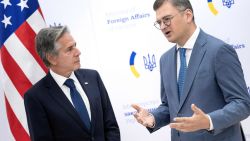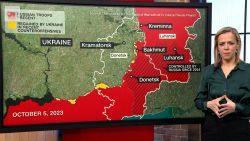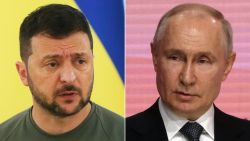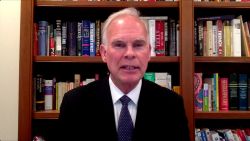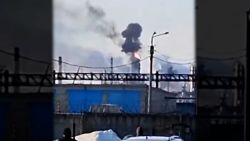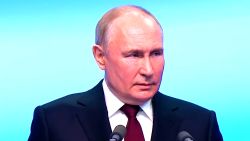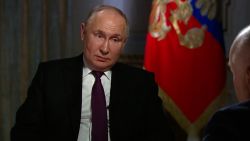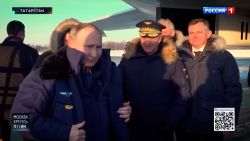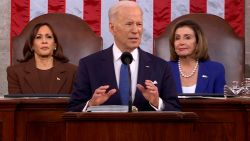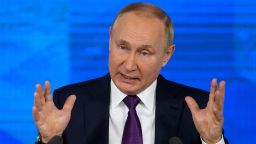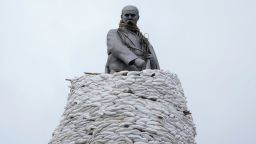Editor’s Note: Stanislav Kucher is a journalist and former Russian TV presenter. He has previously worked as editor-in-chief of the Snob multimedia platform, chief political analyst and creative director of Kommersant-fm all-news radio network, anchor at Sovershenno Sekretno TV channel and editor-in-chief of National Geographic Traveler (Russian edition). He lives in New York. The views here are his own. View more opinion on CNN.
On the evening of February 24, when all the world’s media were reporting on Vladimir Putin’s invasion of Ukraine, my friend and I approached a hotel counter in upstate New York, talking to each other in Russian.
The man at reception, turning away from the TV where CNN commentators were summing up the first day of invasion, greeted us, filled out the relevant documents and wished us goodbye in Russian.
“Have a good evening, you will like it with us,” he said, diligently pronouncing each word.
Turning around, I replied: “Just in case you were wondering, we are against this war.”
“Can anyone be for it?” he answered, surprised. “By the way, I like the Russian language, so I’m learning a little so that I have something to say to the guests.”
As a Russian journalist, I have been traveling to America since 1991, and living here permanently since 2019. Even before this war, my Russian acquaintances were often curious: “Is it true that Russians are not liked in America?’
For many in Russia, their main source of information about the mood in America is the state-controlled RT media, a mouthpiece for Kremlin propaganda. In their view, the West is simply suffocating with hatred for Russians and everything Russian. And, since America leads the West, logically this is the country where Russians are hated most.
But my impression is that Americans for the most part have always understood the difference between the people and the government. In my 30 years of visiting here, I have never encountered Russophobia. And in the almost three months since Putin’s war on Ukraine began, that hasn’t changed.
I live in New York, one of the most liberal and politicized city in America, and regularly travel the country. Whether I’m talking to parents in the playground, storekeepers, waiters, rangers in national parks or just random fellow customers in restaurants, I never hide my origin.
And the question “Where are you from?” always comes third – after “How are you?” and “Where are you going?”
Of course, over the last three decades Americans’ attitude toward Russia has changed. The hopes and excitement around MIkhail Gorbachev’s glasnost in the late 1980s gave way to a calm, even attitude in the 1990s, and then wariness in the 2000s.
Then there was Russia’s war with Georgia in 2008, the annexation of Crimea in 2014, the murder of Kremlin critic and opposition leader Boris Nemtsov in 2015 and Putin’s tightening of the screws of Russia itself – all of which did not produce warm feelings either to the Russian President or Russia as a state.
Now in the shadow of the war in Ukraine, I read about organizations in the US canceling contracts with cultural and sports figures who either have actively supported Putin before or support the Russian invasion of Ukraine today.
But such events should not be called manifestations of Russophobia.
Across America, there are cities and villages filled with signs of solidarity with Ukraine – flags, stickers, posters. And at anti-war rallies, protesters carry caricatures of Putin, declaring just where the Russian warship and invaders should go.
These people might look closely or even suspiciously at any projects and businesses related to Russia – because supporting the aggressor’s economy with money is not only immoral, but simply shortsighted.
These demonstrations do not make me feel uneasy – why would they? Likewise, when I hear a new song by my friend – Russian rock star Max Pokrovsky – with lyrics to the tune of the football chant “Russia go home!” I rejoice for the real Russian patriots who are against this war.
My heart has been with the Ukrainians since at least 2014, and, especially so now, after Putin unleashed this disgraceful invasion.
I admire the courage and resilience of Ukraine as a nation, consider the borders of Ukraine unshakable. As a longtime journalist, I have been criticizing Putin and his policy on all platforms available to me since 1999, long before the first Ukrainian Maidan.
For saying what I truly think, I paid dearly – and I do not regret it. I spoke about the silently obedient majority of my compatriots, on which Putin played so successfully, bringing Russia to the state in which the current war became possible.
It was for such comments, probably, that Russia’s far-right nationalist Tsargrad-TV repeatedly included me in their famous list of “Russophobes” – and “patriotic” Russian commentators refer to me as almost as an agent of world imperialism.
As for the war on Ukraine, I fully accept the concept of collective responsibility – but I do not recognize the concept of collective guilt.
For example, the brave anti-war protesters gathering in Russian cities are brought to the streets by their awareness of collective responsibility. They are not to blame for Putin’s actions – but should also not be surprised or offended by any negative feelings Ukrainians may have toward Russians in general.
Seeing images of war crimes in Ukraine, I feel both pain and shame. But these emotions concern the specific actions of specific humans, those who stand behind them, those who made it possible, who are ready to justify it. These feeling are not directed at all ethnic Russians, or all citizens of Russia.
Just like when I walk into the War Remnants Museum in Ho Chi Minh City and see photos of the aftermath of the carpet bombing of Vietnamese villages, I have very simple negative emotions toward the American pilots who bombed Vietnam and the politicians who gave criminal orders – but they do not apply to Americans in general.
Similarly, to see the atrocities unfolding in Ukraine and think that the Russian people are historically doomed, or a freak nation, a genetically inferior nation, a rapist nation and so on, means to be a victim of exactly the same flawed mindset as those who on the flipside assert that the Russian people are God’s chosen, bearers of a special genetic code or historically called upon to fulfill a unique civilizational mission.
There are no “chosen”, “bad” or “good”, “successful” or “doomed” peoples, states or nationalities. There are peoples and states in which, at a certain historical period, for certain reasons, the bearers of certain ideas and human qualities triumphed.
Stupidity, meanness, cowardice, venality, fascism. These do not and cannot have a national identity. Just as genius, decency, fearlessness, honesty and any “isms” that you prefer do not have it.
“Russian”, “Ukrainian”, “American”, “German” – these are just the shirts in which we were born.
I love the Russian language and I was happy to teach it to my American friends. But it would never occur to me to be proud of the fact that I speak it, as well as the fact that Russia is the birthplace of Tolstoy, Dostoevsky, Chekhov, Putin or the Pussy Riot art band.
In the same way, I will not feel guilty about social experiments, military adventures and other – and here, excuse my English – f*****s of my ancestors or compatriots that I had nothing to do with.
Get our free weekly newsletter
It is necessary to study the lessons of one’s country’s history, its culture, to apply this knowledge for the benefit of contemporaries and descendants. But it’s illogical, stupid and dangerous to experience strong feelings from associating oneself with it.
The only time when pride from belonging to a nation, people or state is a justified feeling and should be encouraged is when this nation, people or state is defending their life and freedom against invaders.
So I rejoice when I see the flag of Ukraine. Because now it is this flag that has become a symbol of the fight against evil. While the Russian tricolor, alas, has become a symbol of that very evil.
Yet any flags are just symbols. The choice of who I am with, is up to me.


